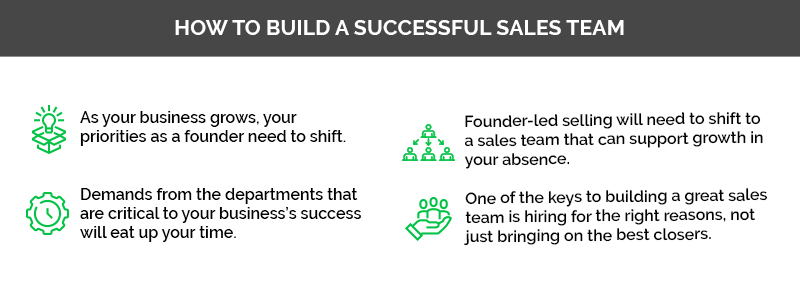How to Build a Sales Team that Rocks Even When You’re Not There

The demand for a founder’s time grows as their business expands. Building a sales team that consistently meets targets in your absence is key to maintaining forward momentum.

As a business founder, company growth has been a major goal for longer than you can remember. Now that it’s happening, you might be noticing that the demands on your time have also grown – maybe to the point where it would be impossible to stay in any department for too long without cloning yourself.
This wasn’t how it was in the beginning, when you took charge of everything: selling, training, answering phones, setting appointments, speaking to prospects and customers, closing deals, and more. It was hard work, but it also worked like clockwork – until it didn’t anymore.
Here’s what you need to know about the growth process, how to identify when something needs to change, and the steps you can take to ensure your company keeps growing.
What happens when you start to outgrow your operations
When your hard work and consistency started to pay off and your company started to scale, you likely quickly learned you needed to employ more staff to handle growing demand and increased operations. Maybe you delegated some tasks, but you might also have tried too hard to protect the systems you put in place as the company’s original best employee.
Here are some common signs that you may have put yourself in a position where you’ll either need to learn to delegate or clone yourself:
- You feel you’ve done enough to maintain order in other departments while you carry on with founder-selling.
- You’ve actually thought you should keep founder-selling.
- You’re worried your new sales recruits need some more sales team training before they can get the hang of how you do things.
- Other departments need your help to establish order, expectations, and culture as you’ve done with the sales process.
The truth is that continuing with founder-selling is no longer viable. You need to step aside and trust a sales team, or you risk cheating your company out of achieving its potential. You’re not alone, though: This is the story of founder-sellers all over the world, but there is a solution.
How to hire a great sales team you can trust
The good news is you can create a great sales team that takes the pressure off you and meets your sales targets while you attend to other parts of your business. It all starts with hiring for the right reasons. This can be tricky, but you’re more likely to make the right choices by adhering to these hiring tips:
Screen for the skills your top performers have
If you have high-performing salespeople in your company, carry out an assessment to pinpoint the traits that make them successful and hire recruits with the same traits. Behavioral interview questions that could pinpoint such traits are usually open-ended:
- Talk about a situation in which you had to choose between what was ethically right and the easy option. What did that experience teach you?
- Talk about a time when you received critical feedback in the past
- What can you tell me about our company’s offerings (products or services)?
Your behavioral assessment should screen for innate qualities that have proven helpful, and is important because innate traits are difficult or impossible to train into people. This process can let you know if a particular candidate is cut out for success at your company.
Hire helpers, not just closers
Successful sales teams prioritize helping over selling. Customers have elevated expectations about how well salespeople understand their business and how customized the sales approach is. Your prospects are so inundated with choices that they will choose another business simply because it’s more helpful or understanding of their situation.
It’s thus important to turn away from the one-size-fits-all approach to closing and hiring. Look for individuals who will collaborate with other departments – like marketing, finance, and product teams – to offer more help to prospects and, ultimately, make a sale.
Look out for data skills
Data is increasingly important in sales. Salespeople now have a growing number of tools at their disposal to analyze demographics, evaluate trends, and review customer feedback. Gut instinct and people skills are still important, but data skills can take both to a level that would otherwise be unreachable. You want salespeople who are excited about tech and data, or at least open to learning about them.
Prioritize digital marketing skills
The best salespeople today have their very own sales pipeline they manage with digital and social media marketing savvy. Salespeople who are thought leaders on social media or have a robust and professional social media presence can easily leverage their networks to make sales on the platforms they use.
Incentivize high performance
Salespeople who are rewarded through incentives like quarterly bonuses become more engaged. Don’t try to reinvent the wheel, though. Keep it simple: They are more committed when they have some sort of variable-based compensation, but you should consider avoiding compensation caps. Caps could actually de-incentivize your salespeople and hurt your sales and company culture in the long run.
Build a world class sales team without cloning yourself
You can have a world class sales team growing your company for you, and all it really takes is trusting an expert team of consultants to help. MetaGrowth Ventures provides the tools necessary to guide founders and CEOs through the sales team-building process and get them unstuck from founder-selling.
Our team leverages tens of thousands of hours of sales experience to help you assemble and train the sales team your company needs to get to the next level, meaning you get to focus on growth instead.
Contact MetaGrowth Ventures to learn more.
Written by
Joe Arioto
